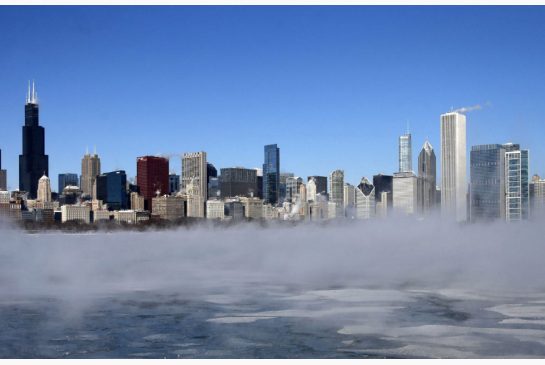
The so-called “polar vortex,” a pipeline of cold Arctic air pummeling the central part of the continent, is dominating headlines as it plunges various areas into record-low temperatures.
The vortex is a whirlpool of cold air making its way from Nunavut down through Manitoba and Saskatchewan and into the United States, setting many record temperatures along the way. States as far south as Georgia and Florida are being hit.
It’s also affecting Ontario, where there are widespread wind chill warnings in effect. Powerful snow squall activity around Georgian Bay and Lake Huron has resulted in blizzard warnings.
“With the depth of cold air that we’re looking at, it is a possibility that a number of cold-temperature records could be broken in southwestern Ontario,” said Geoff Coulson, meteorologist with Environment Canada.
“In Toronto, we’re going to be in the depth of cold through until Wednesday . . . The polar vortex will no longer be an issue as we head into the weekend.”
Although Canadians are not strangers to these blasts of frigid air and rapid temperature drops, the term polar vortex isn’t commonly used here, said Coulson. Rather, it’s being used in earnest by Americans to explain the cold Canadian air that’s currently invading the U.S.
The vortex has even garnered the nickname “polar pig” after the term was used to describe a bulge of cold air, during an interview last week.
“It definitely looks like one heck of a ‘polar pig’ shot,” Kyle Cooper, director of research with IAF Advisors in Houston, told Bloomberg News on Friday.
Other wacky terms being coined include “Chiberia,” to describe record-low temperatures in Chicago. (On Monday morning, temperatures there dropped to a record -27C. The wind chill makes it feel like -50C.)
Online, the term polar vortex is dominating headlines and social media sites.
The winter weather is bringing up a lot of meteorological terms that aren’t typically used, such as ice storm, frost quakes, freezing fog and cold wave.
“The overall winter itself, just in terms of the depth of cold faced by the prairies and northern Ontario, has been noteworthy,” said Coulson. “I’ve got colleagues working in offices in Winnipeg and Saskatoon that have talked about the unrelenting nature of the cold this year.”
Toronto is still cleaning up after a devastating ice storm that struck days before Christmas, coating the city in ice and bringing down power lines and tree branches.
And just last week, some Toronto residents woke up to a booming sound in the night caused by frost quakes. The rare phenomenon occurs when water in the soil freezes and expands until there’s a release of pressure. That release can result in a “sonic boom,” capable of rattling windows.
Many Canadians have also experienced freezing fog, or a reduction in visibility when temperatures are less than 0C, and a cold wave, which is a rapid change in temperature from mild to very cold.
- 本文為轉載文章 作者及出處為 Isabel Teotonio 。 [原文]
- 關鍵字 : vortex, polar, temperatures, record, there, terms, temperature, quakes, frost, depth, being, Toronto, Ontario, Coulson, winter, warnings, until, through, storm, release
